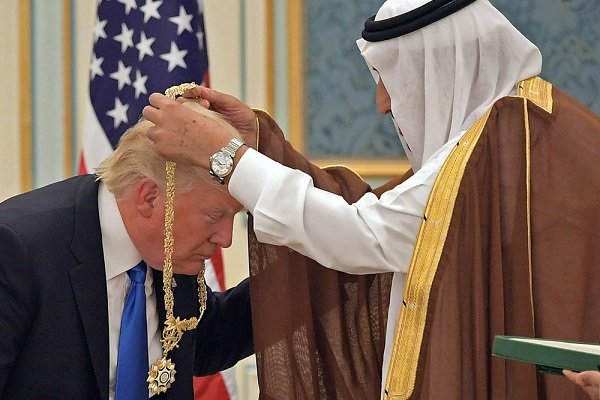Trump’s Anti-Iranian Gambit

President Trump’s recent trip to Saudi Arabia and Israel was marked by ratcheting up his anti-Iranian rhetoric and a huge arms sale ($110 billion) to Saudi Arabia. This massive infusion of military hardware and technology into the region raises many questions—not the least of which is what do the Saudis plan to do once having acquired such military might?
Historically, the Saudis have never contributed any substantial number of ground troops to regional wars and civil wars. In recent years, they have relied on the air power, but even then, they have had limited success or effectiveness, as is evident in the case of their military involvement in Yemen. The steady and brutal punishment of Hothis in Yemen has yet to yield a desirable outcome for them. Air power alone has never determined the outcome of a war on the ground.
Since the Saudis cannot maintain considerable leverage in shaping things to come in Yemen, Syria, and Iraq—not to mention defeating and dismantling ISIS, which has fortified a reliance on the propagation of an austere version of Islam called Wahhabism and/or Salafism—they will most likely prefer to drag the United States into a regional conflict with Iran—an eventuality that would entail devastating consequences for the entire region and beyond. The transactional nature of arms sale to the Saudis notwithstanding, the peril lies in a slow drift into a military confrontation with Iran. It may seem more complicated than the ever-present and simplistic cliché that U.S. allies should not pass the test of democratic governance if they help Washington in its fight against terrorism.
If the Trump administration plans to isolate Tehran and provoke a military confrontation with Iran by encouraging the Saudis to shoot the first bullet, President Trump will be disappointed, to say the least. This strategy will prove to be foolish beyond compare, in large part because American’s European allies—as well as Russia and China—have decided to abide by the nuclear deal, and ironically, outside their rhetorical flourishes, so has the Trump administration. The rest of the world has accepted the legitimacy of the nuclear deal and Iran has indicated that it will fulfill its obligations in accordance with the nuclear deal.
Perhaps the most disturbing aspect of such anti-Iranian rhetoric is that President Trump has turned a blind eye to Iran’s internal political dynamics. Domestically, Iran is undergoing a massive transformation caused by technology, evolving civic culture, and a growing commitment on the part of the youth to control their destiny. The mood has changed in Iran and pronouncedly the public pulse is in favor of integrating into the world economy and breaking from years of strategic isolation. Two groups: youth and women, have overwhelmingly supported Rouhani in his re-election, and are hopeful that he will lift social restrictions and normalize ties with the West. Demographics has become destiny in Iran, as it has caught up with Iran's internal politics. The religious right has lost its ideological and political appeal. Iranian elections are yet another testament to the social power prevailing over established authority, with the power of ICTs and social media playing a crucial role in Rouhani's victory. President Rouhani will face many formidable challenges ahead, but he has secured a resounding public endorsement—at least for now. This is the time when diplomacy, dialogue, and engagement with Iran should take precedence and should be utilized as a means of resolving conflicts and disputes—regionally or otherwise.
Mahmood Monshipouri, PhD, teaches Middle Eastern Politics at San Francisco State University and University of California, Berkeley. He is the editor, most recently, of Inside the Islamic Republic: Social Change in the Post-Khomeini Iran (NY: Oxford University Press, 2016).
Leave a Comment